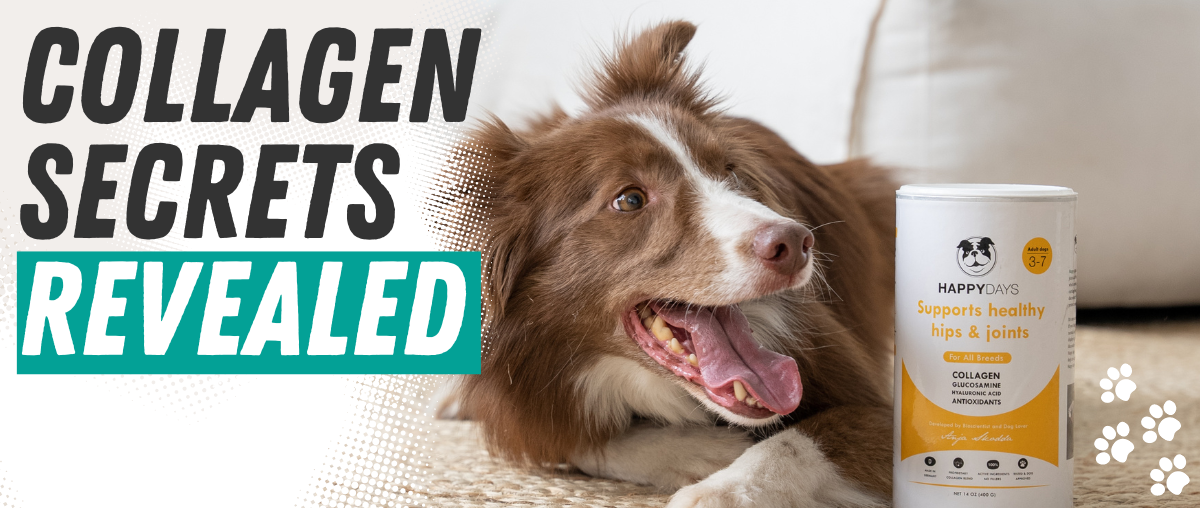Your Cart is Empty

Why Collagen is So Important in Your Body and How to Keep it Active
|
|
Time to read 5 min
|
|
Time to read 5 min
Collagen is a fundamental building block in human and animal bodies, crucial in maintaining healthy skin, joints, and overall connective tissues. Anya, the founder and chief scientist at Happy Again Pet, shares her insights into why collagen is vital and how we can actively work to maintain its production as we age.
Collagen is the most abundant protein in our bodies and is critical for maintaining the integrity of our skin, joints, and connective tissues. Our bodies constantly produce and degrade this large molecule. However, as we age—around 25 years old in humans and 2 years in dogs—the balance between collagen production and degradation shifts, leading to decreased collagen levels.
Reduced collagen production can lead to several issues, including:
One of the challenges with collagen is its size; it's a giant molecule. Topical collagen products, such as creams and serums, are ineffective because collagen cannot penetrate deep enough into the skin to be absorbed. The key to effective collagen supplementation is breaking the collagen into smaller fragments that can be absorbed into the bloodstream.
Two primary methods for breaking down collagen are enzymatic hydrolysis and chemical processes. Enzymatic hydrolysis is preferred because it gently breaks down collagen into amino acids without damaging them. These amino acids are the building blocks for new connective tissue and joints, making them essential for effective supplementation.
Vitamin C is crucial for collagen production. Historical examples, like sailors suffering from scurvy, highlight its importance in maintaining connective tissue health. Combining hydrolyzed collagen with vitamin C can significantly enhance its effectiveness. Additionally, hyaluronic acid, known for its moisturizing properties, supports joint and skin health from the inside out.
While raw diets for pets, including marrow and bone broth, contain collagen, the form present in these foods is not easily absorbed by the body. Hydrolyzed collagen, on the other hand, provides amino acids that act as a catalyst for your body's own collagen production rather than directly supplying collagen to be built into tissues.
For effective results, humans should consume a minimum of 10 grams of collagen per day. The dosage for dogs varies based on weight, with recommendations ranging from 5 to 20 grams. Adjusting the dosage based on the animal's size and specific needs is essential.
Choosing a powder form for collagen supplementation ensures purity and efficacy. Powders allow for the inclusion of pure, active ingredients without the need for fillers, preservatives, or flavors. Happy Again Pet's collagen supplement is designed with this philosophy, providing a straightforward, effective way to support joint health and overall well-being.
Collagen plays a vital role in maintaining our bodies' and pets' health and vitality. Understanding the importance of collagen, how to properly supplement it, and the roles of supporting nutrients like vitamin C can significantly improve joint health and skin elasticity. By focusing on effective forms of collagen supplementation, we can help keep our bodies and furry friends happy, healthy, and active for years to come.
For further information on the science behind collagen, its benefits, and how to best supplement it for you and your pets, reaching out to specialists like Anya at Happy Again Pet is an excellent step toward optimal health and wellness.
Collagen is the most abundant protein in our bodies and is crucial for maintaining skin integrity, joint flexibility, and connective tissue health. It also ensures skin elasticity, joint flexibility, and overall tissue health.
Collagen production typically starts to decrease around age 25 in humans and around age 2 in dogs, leading to signs of aging such as wrinkles and joint stiffness.
Hydrolyzed collagen supplements are beneficial because they provide easily absorbable amino acids, the building blocks for new collagen. These amino acids help improve skin health, joint flexibility, and overall vitality.
Topical collagen products often fail to deliver the expected results because the collagen molecule is too large to penetrate deep into the skin, making it ineffective in boosting collagen levels internally.
Enzymatic hydrolysis is a process that breaks down collagen into smaller peptides through enzymes. This makes it easier for the body to absorb without damaging the essential amino acids.
Vitamin C plays a critical role in collagen synthesis, making it essential for enhancing collagen absorption and effectiveness in the body.
Hyaluronic acid helps moisturize and lubricate joints and skin from the inside, working synergistically with collagen to improve tissue health and elasticity.
Collagen from food sources often comes in its original large molecule form and is less efficiently absorbed by the body. Hydrolyzed collagen, however, is broken into smaller peptides, making it more bioavailable and effective.
For optimal benefits, humans should consume a minimum of 10 grams of collagen per day. Dosages for dogs vary based on size and specific health needs.
Powdered collagen is preferred because it typically contains pure, active ingredients without unnecessary fillers, preservatives, or flavors, ensuring higher efficacy and purity.
Yes, collagen supplementation can help alleviate joint pain by promoting cartilage regeneration and providing the joints with the necessary building blocks for repair and maintenance.
While individual results may vary, most people begin seeing noticeable skin texture and joint comfort improvements within 4 to 6 weeks of consistent collagen supplementation.
Collagen supplements are generally safe and well-tolerated, but some individuals may experience mild digestive discomfort as with any supplement. Before starting any new supplement regimen, it's always best to consult with a healthcare provider.
Absolutely! Like humans, collagen can support joint health, improve coat quality, and enhance overall vitality in pets, particularly aging dogs.
Collagen supports skin health by maintaining its elasticity, hydration, and strength. It reduces the appearance of wrinkles and helps the skin appear more youthful and vibrant.
